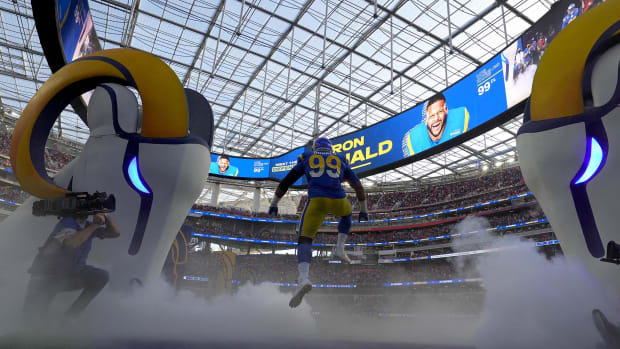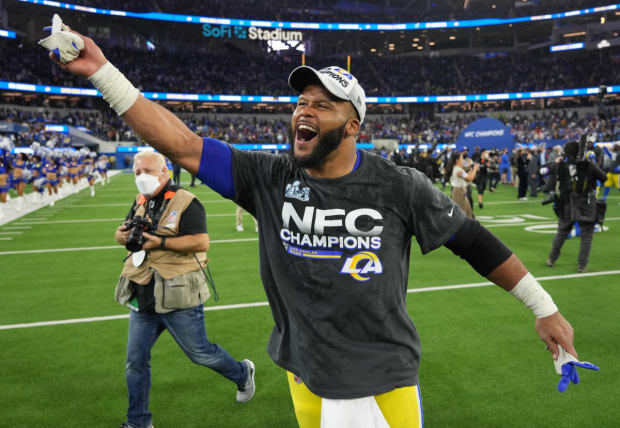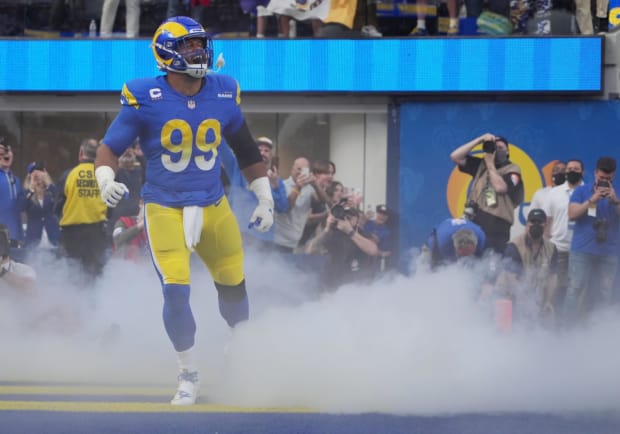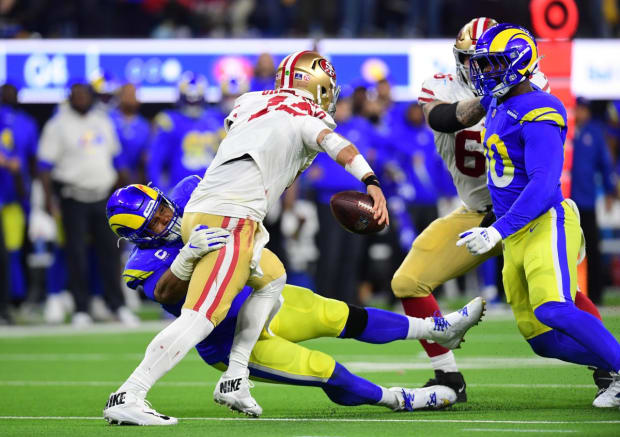Formative years in “The Dungeon,” meticulous organization, all leading up to Sunday, when he has the chance to fulfill a promise made.
Ten days after the Rams collapsed late against the 49ers in their regular-season finale, and 48 hours after they demolished the Cardinals in their playoff opener, Aaron Donald opened his patio door and began a conversation with his parents. It was, like Donald himself, brief, detailed and precise, hitting with the force of a lightning bolt. He laid out the other contenders the Rams might face in the coming weeks. He knew that, if they managed to beat Tampa Bay on the road, they were more likely to clash with Green Bay (seeded first) than San Francisco, their NFC West nemesis and a team L.A. had not beaten since 2018.
Donald stood in the doorway, addressing his father, Archie. He said the Rams would topple the Bucs and smirked at the match-up he really wanted after that. “Dad, I want nothing else,” he said, “I want to go through the 49ers.” His eyes narrowed as he said that, smirk vanishing into something like a glare. Then he shut the door so hard it clanked and walked off. “Like the younger generation says, he dropped the mic,” Archie says with a laugh.
His son left so quickly he never did hear his father’s warning. Be careful what you wish for, now.
Turns out, Donald had started to fixate on the 49ers immediately after the loss in Week 18. While considering the entire playoff schedule with his wife, Erica, he said the same thing he told his parents. Erica says he wanted to “speak” the opponent “into existence.”
“I know we can beat them,” he said.
“You can’t write a better script than that,” she responded.

USA Today Sports
Whether through kismet or coincidence, his wish came true. The Rams did take down the Bucs, and the Niners did upset the heavily favored Packers, setting up an NFC championship game that doubled as the latest installment of a one-sided rivalry. More on that later, but for now, consider the aftermath. Erica had given birth to their son, Aaric, in September, and she chuckled along with reporters whenever Aaron noted his lack of sleep at news conferences. She heard his 8-year-old daughter, Jaeda, call before the Bucs game to encourage him. “Whose house?” Jaeda asked. “Our house!” her dad shouted back. And Erica also knew that, when the Rams played in Super Bowl LIII three years ago, he had promised Jaeda she would be able to play in confetti after L.A. triumphed. The Patriots upended the Rams instead. But now, after targeting and beating the 49ers, he could make good on a promise unfulfilled.
Before kickoff, Erica asked her husband if he wanted his family to run down to the field afterward. He wasn’t sure. As the final seconds of the Rams’ victory ticked away, Erica turned to Jaeda and asked if she wanted to go down. “Yes, ma’am,” Jaeda responded, and they scampered off. When they reached the sideline, not only had the game ended but dad had retreated to the locker room to celebrate with his teammates. A team official fetched him, and he jogged back onto the field and beelined for his family. Erica jumped into his arms. “I’m so proud of you!” she shouted.
It sounds trite to compare this Rams season to a movie. But for Erica, the Donalds and so many others, it really does feel that way. At that moment, in her husband’s arms, memories cycled rapidly through her head. The Super Bowl loss. The promise he couldn’t keep. The workouts. The film study. The conversation in the doorway. The triumph.
The kids made confetti angels on the turf at SoFi Stadium, everyone running in circles, delirious, elated. Erica reminded the children not to stray too far, because she didn’t want to lose sight of them. Her husband, she says, was “super turnt, screaming and happy and all that stuff.”
But she noticed something later, as he marched back to the locker room. His demeanor had already changed. No more smiles. No more screams. “Job’s not finished,” he said, echoing the Rams’ stated theme for this season. Job’s not done, they tell each other, especially now, with another Super Bowl fast approaching.
Erica Donald always asks her husband the same question: Do you know how great you are?
He’ll laugh and mumble out something like, “No, whatever,” and she’ll push back, because she believes he should know what the rest of the football world long ago deemed an unassailable truth. “No, but do you know how great you are? How impactful you are? How talented you are?” she’ll ask. When pressed, he might admit that, in some ways, the dominant nature of his career changed professional football, from rule alterations to blocking schemes and pass-rush techniques to ongoing hunts for teams desperate to add any defensive tackle prospect who possesses even a slight resemblance to his skillset.
As she tells the story over the phone this week, Aaric wakes up from his nap. He’s crying, and as she picks him up, her husband arrives home after another workday. He’s not interested in detailing his own greatness. He’s interested in grabbing the baby and booking it out of earshot.
In regard to her question, the overall answer is yes, of course, no doubt. Donald knows how great he is because everyone knows how great he is, because his statistics scream how great he is, because legends opine about how great he is. He’s only 30 years old, but has made eight Pro Bowls and been named All-Pro seven times, including this season, where he was a unanimous selection. He won Defensive Rookie of the Year in 2014 and Defensive Player of the Year in ’17, ’18 and ’20. He’s already the Rams’ modern-era sack leader, in only eight seasons. But all of that alone does not fully capture Donald’s impact. Pro Football Focus illuminated that more fully in early January, posting the leaders for total pressures over the past five seasons. Donald, naturally, ranks first with 501. And while that is a staggering total, what’s more staggering about it is the gap between him and Cameron Jordan, the Saints’ defensive end who ranks second on that list.

USA Today Sports
In a text message exchange, Jordan said he wasn’t aware of the statistic PFF unearthed. He figured Donald had the most and called him a “different breed,” then noted just how different, because, unlike Jordan, Donald rushes quarterbacks from the interior of the line mostly, rather than from the edge. “Legendary, for sure,” Jordan wrote. When he received a screenshot of the pressures tally, he responded instantly, with two crying emojis, “he’s got 141 more pressures than me,” and three more crying emojis. Jordan registered 30 more pressures over the past five seasons than Joey Bosa, 35 more than Chris Jones and 38 more than Khalil Mack. The gap between the best sack artists of a generation and the very best is that vast.
Hence another dominant season for Donald in 2021: 12.5 sacks, 84 pressures, 77 tackles and four forced fumbles. He could easily have won another defensive player of the year award but didn’t, in part because T.J. Watt matched the single-season sack record but mostly because, at this point, Donald’s only competition is himself.
The havoc that Donald creates, manufacturers and turns up on football fields every season is grounded in a counterintuitive notion: organization. The sacks he nets are the result of a careful, deliberate plan from which he never deviates. He maps out his days to the minute, works out almost year round and eats cheat meals, or hangs out with his friends, only when the schedule calls for a rare indulgence. He once told his pass-rush coach, Chuck Smith, that he trained six days a week, almost every week, in every single year. He can seem robotic in that way, programmed, like a pass-rush cyborg sent from the future to destroy quarterbacks across the NFL. But Donald views his routines more as his foundation. In order to play freely, without thinking, he must follow them. That concept, one central to his existence, was drilled into Donald almost from birth.
Sometimes, he’ll text his father the same message: You created a monster. That’s true. In 1991, the year Aaron was born, Archie spent $1,300 on a weight set he purchased from a powerlifter who was retiring. In the ensuing years, he put the dumbbells and barbells to good use. At first, he told his sons, Aaron and Archie Jr., to watch him closely as he lifted. He wanted to make them “alpha males, exceptional workers,” strong and fortified and ready for all the complications the world would throw at them. Aaron was still in diapers when that started. As he grew, he added some fat around his midsection, and his father found him “lazy,” and less-than-attentive to his chores. That’s when Archie Sr. began training his sons at 4:30 a.m. each morning. They reported to the basement they referred to as The Dungeon for two-hour workouts. How great you are started then, when Aaron was 11.
The Donalds lived in the Lincoln-Lemington-Belmar section of northeast Pittsburgh, and the people in that place—gritty, resolved, making do with what they had—shaped Aaron, too. Eventually, he could bench press more than 400 pounds as a teenager. After one year of Dungeon toiling, the roles reversed. Aaron would wake his father up for training sessions. He loved the routine so much that Archie had to remind him “you’re not a bodybuilder; you’re a football player”—and a fearsome one at that. Archie insists he noticed Aaron’s greatness the first time the boy tugged on shoulder pads and de-cleated linemen who were three and four years older than him.
They began adding to his portfolio of talents with elements like immersive film study. Sometimes, Aaron scoured tape of elite offensive linemen and top quarterbacks until he could spot their tendencies and how they related to the schemes their coaches had chosen; other times, he studied legends like John Randle, DeMarcus Ware and Warren Sapp, hunting for moves or techniques he could incorporate. He developed a swim move, refined his bull rush and continued to add strength, transforming from a—get this—finesse pass rusher to a complete player who blew by opponents in two steps or less. All the work, planning and visits to The Dungeon built his instincts, until they served as GPS coordinates for where quarterbacks would end up and how he could most quickly reach them. He knew the game so well he even made a cameo on the o-line, at guard, according to Demond Gibson, his defensive line coach at Penn Hills High. “He would drive people 20, 30 yards off the football and bury them,” Gibson says.
Donald stayed close to home, went to Pitt and continued to sharpen his routines. The Panthers had noticed him during film study, as one coach told the room, “Nobody can block him.” Donald put more weight on, until he tipped the scales at 280 and could bench more than 500 pounds. But even as he wrecked opponents and their plans, he worried about skepticism from NFL teams, who would undoubtedly find him, at 6'1", undersized. Archie says his son planned to enter the draft after his junior season, only to be given a fifth-round(!) grade. He stayed, dominated and demolished, and that went even for his teammates, who were so banged up from battling Donald that coaches held him out of practice for weeks in order to protect the other players. Assistants found him alone in the defensive line room after games, watching film. “There were many times he slept in there,” says Chris LaSala, a Pitt assistant.
Donald began preparing for the draft, engaging in daily workouts with Smith, his private coach, in Arizona. Smith introduced Donald to the cross-chop, now his signature move. Donald’s agents wondered whether Smith could help him slide into the first round. Smith laughed, before telling them there “wasn’t a number high enough” for where Donald should go.
One day, after they climbed a fence to fit in yet another session, Smith told Donald what he truly felt. “Man, you’re gonna end up being the greatest pass rusher of all time,” he said. “You have the potential.” Smith asked Donald the same thing his future wife would. “Do you realize that?”
Donald smiled, sheepishly, Smith remembers. He knew. “I plan to be,” Donald responded. “I’ve been this size my whole life, and I’ve been whooping everybody from the time I put on pads.”
Smith started calling any executive he had contact information for. He left one voicemail for the Rams general manager, Les Snead. “Look, man,” Smith told him, “this dude is the truth.”
Donald ran a 4.68-second 40-yard-dash at the NFL Scouting Combine (or almost as fast as another star teammate, wideout Cooper Kupp). He did not yet know that one particular coach on one particular team saw the same thing that his father did.
As a marine who became a football coach, Mike Waufle studied so many defensive linemen that he started to buy one obvious theory: size mattered. But he came to the same conclusion as the Pittsburgh coaches while analyzing Donald’s film. He had never seen a more obvious exception. Waufle became borderline obsessed. He even kicked open the door to a meeting to introduce Donald to decision-makers during Donald’s pre-draft visit to St. Louis. Then he bent down so he and Donald were the same height, as if to say, see, no problem!
On that same visit, Snead asked Donald how he had “overcome his limitations.” Donald answered decisively. He didn’t view them as limitations at all.
Waufle continued to pitch, attempting to win over skeptical scouts. He made a presentation to all of them, highlighting some of the top-rated defensive tackles in the NFL and in that draft class. Donald had comparable measurables in everything except for height. He reminded the room of his master’s degree in exercise physiology, where he learned a simple but central concept: power equals force times velocity. In football, that translates to strength times speed. “Remember the Russian in Rocky IV and how he punched the computerized measuring device?” he asked. “That’s the best way to describe Aaron. His ability to generate that kind of force is phenomenal, unmatched. Height doesn’t matter. Size doesn’t matter. He has long arms …”
Then, the crescendo: “The best defensive lineman in the draft is this guy!” Waufle said, voice booming. Then he took Donald’s nameplate and slapped it atop the board of rankings for defensive linemen, above even Jadeveon Clowney, who would be taken first overall. “It’s Aaron Donald!” Waufle shouted. “He’s the best player I’ve ever seen!”

USA Today Sports
The Rams held at least some skepticism—they chose an offensive lineman, Greg Robinson, with the second overall pick in 2014. But they also held the 13th selection. As other teams made their choices, Waufle’s nerves and anticipation grew. He worried in particular about the Lions, at pick 10, and danced when they nabbed tight end Eric Ebron. Coach Jeff Fisher stopped by and said with a wink, “Mike, you got your guy.”
Waufle couldn’t have known how right he was about Donald’s superhuman force. But he found out soon enough during offseason workouts, when Donald smacked into a blocking sled before Waufle could move his hands out of harm’s way. The force sent him flying into the air, and the fall bruised his ribs. “I don’t know if I can do this with you anymore,” Waufle told Donald.
The evolution continued, for both Donald and for defensive line play in the NFL. Waufle taught Donald hand-to-hand combat techniques that he borrowed from studying boxing trainer Cus D’Amato. Donald continued to develop moves with Smith, who works with dozens of elite defensive linemen. To Andrew Whitworth, the Rams’ left tackle since 2017, Donald came to embody the variance modern pass rushers apply to their approach. “All these hand swipes and moves are just so different,” Whitworth says, in comparison to 2006, his rookie season. “These guys are borderline MMA fighters with how they’re rushing now. Watch Aaron’s arms and hands; it’s absolutely crazy. It’s like trying to block a windmill.”
Donald beat linemen with those hands and arms. He beat them with power and explosiveness. He beat them with the agility and footwork of a ballet dancer. He also beat them with all those mornings in The Dungeon, with organization, attention to detail and continued film study. He beat linemen by studying their feet placement, or where the quarterbacks they protected liked to settle in the pocket. Sometimes, Sean McVay noticed a light on in the defensive line room late at night. It was Donald. Old habits and all that.
To call Donald “complete” seems insufficient. Like in 2018, when he led the Rams to the Super Bowl, while collecting 20.5 sacks as a defensive tackle. In terms of accomplishments relative to elite peers, the comparisons started to become historic. The distance between Donald and his counterparts is matched only by a Jerry Rice, or a Tom Brady. Not even the two pass rushers who generally are considered the best to ever—Bruce Smith and Reggie White—can say the same.
His closest historical comparison is John Randle, who played inside, at 6'1" and 285 pounds. In 14 seasons, Randle notched 137.5 sacks. In eight seasons, Donald has already accumulated 98.0. Throw in his double-team percentage (60.5% this season on pass-rush snaps, according to NFL Next Gen Stats, ranking third-highest in the league), his win rate (beating his blocker within 2.5 seconds, tops in pro football at 38.8%) and the triple teams he now obliterates, and Donald doesn’t have an active peer. It’s funny, given all the height concerns. They’re now all looking up at him.
In the offseasons, Donald went back to Pitt, where his alma mater kept a locker for him at its practice facility. He went there every day and even called LaSala one summer on the Fourth of July, hoping the assistant could unlock the building.
As Donald sought a new contract in 2017 and ’18, he staged training camp holdouts. But he told LaSala, “I’ll be fine, I’ll get to play football, and they’ll pay me. And when I get back, I’m still going to be the best player in the world.” When Mack signed an extension with Chicago, LaSala joked with Donald that Mack must be the better player. “Come on, coach,” LaSala recalls Donald responding. That sentence marked the most boastful thing he ever heard Donald say.
Donald signed an extension of his own that same week, as the Rams recognized his value with a six-year, $135 million deal with $87 million guaranteed, making him the highest-paid defensive player ever. He called his father, telling Archie “you can hang up your cleats now,” and bought each of his parents their own new house. Archie wanted to sell the one that Aaron grew up in, but The Dungeon and its impact were too deeply ingrained. His son turned it into a “workout house” instead. Because of course Donald has a house he uses only for workouts.
The Rams made the Super Bowl that season. Before the game, someone asked Bill Belichick what stood out about Donald. “Everything,” Belichick mumbled. “He’s pretty much unblockable.” But Belichick still triumphed, and Donald did not consider the progress the Rams made as anything more than one step toward the destination he desired. He skipped the postgame soiree and hung out with Erica, his children and his parents in a hotel suite. He flew home, rested for all of three days, and went right back to the gym.
Watch NFL games online all season long with fuboTV: Start with a 7-day free trial!
In the seasons that followed, the Rams missed the playoffs, made the playoffs and continued to reconfigure through this season. This past winter, they hired Raheem Morris to replace departing defensive coordinator Brandon Staley. They traded Jared Goff to the Lions for Matthew Stafford; the move came as a surprise to Donald, who was notified via a FaceTime call with Stafford, Whitworth and McVay. Donald told family members he could sense an ideal alignment for the season, which Snead bolstered by adding Von Miller and Odell Beckham Jr. during the fall.
Sometimes, Donald thought back to how his 2020 season ended: in Green Bay, on the sideline, having tried to play through cracked ribs but unable to finish. Television cameras filmed the tears that formed in his eyes. To Donald, they were significant. “I just care,” he says. Morris, watching the game on television, “felt that hurt, that pain.” When he joined the Rams later that month, in Jan. 2021, the first thing he told Donald was, “I’m going to do everything in my power, everything possible, to help you win a championship.”
Everyone seems to feel the same way. Smith wants Donald to win because he’s a superstar who never acted like one, because he texts Smith’s son on his birthday and never big-times any request. Rams Hall of Famer Eric Dickerson wants Donald to win because a player of his caliber deserves a defining moment for his legacy, because, Dickerson says, “he’s Reggie White incarnate, true greatness.” Goff wants Donald to win because of the classy text that Donald sent him after the trade.

USA Today Sports
Then there’s Miller, an elite pass rusher in his own right, and one-half of the most fearsome defensive line combo in these playoffs. Miller wants Donald to win for the vocal leader Donald has transformed into, with an assist from Miller himself.
Erica Donald says her husband entered this season determined to speak up, and more often, attempting to maximize his impact by doing what made him uncomfortable, because the Rams needed to hear his voice more. She also saw him grow into himself and his role in the locker room, too.
Miller knew Donald before he arrived, after Donald visited Miller’s annual Pass Rush Summit in 2019. But while Miller thought he understood the totality of Donald’s impact, he didn’t fully grasp it until he watched other Rams and how they looked at Donald with starry eyes. The sack-seekers started to sit next to each other on flights to and from away games, and after Los Angeles outlasted Tampa Bay, they plopped down across from each other in the same row. Miller did not tiptoe into the conversation. “Sometimes, you just gotta talk to the guys,” he told Donald. “They watch you, and they want to put their necks on the line for you. They just want to hear Aaron say, let’s go. But you don’t say that [enough].”
Miller shared his own impressions of Donald from the two months they had spent together. More than skills and sacks had stood out to him. Donald’s determination was what, Miller says, “blew me away.”
“You can just feel, like, your energy,” Miller told him.
When Donald nodded, Miller didn’t think his mini-speech had any sort of impact. He was wrong. Donald delivered messages all week before the 49ers game, and when the Rams cut into a deficit early into the fourth quarter, Donald’s signature moment arrived. He gathered the defensive players together on the sideline. Miller looked into his eyes and saw “a fire burning.” He heard Donald’s voice crack; it meant that much. He shouted: “We’re one game away! We’re playing for something, man! It’s got to mean something to you! Everything we got! Everything you got! Let’s finish this!”
They did. The defense responded to Donald’s missive, forcing punts on San Francisco’s next two possessions as the Rams took the lead. They did, because Donald, with another assist from Miller, willed the defining play. It happened on the third possession after he delivered the sideline speech. Miller recognized the call immediately; oddly, he remembered studying a similar 49ers sequence while still playing this season for the Broncos, turning to a young D-lineman and telling him they could utilize what they saw Donald doing on the screen. Donald was pushing straight ahead, after the defensive end took the right tackle wide, away from Donald, who Miller says looked “like a lion chasing down an impala, just swiping at his prey.”
Miller expected the 49ers to call timeout there. They did not, and he was late off the ball. But as quarterback Jimmy Garoppolo dropped back, Miller swung wide and pulled the right tackle with him. Donald found himself one-on-one, muscling his blocker backward toward Garoppolo. Same sequence. Ideal result. As Donald spun Garoppolo around, the quarterback tossed up a desperation heave, which was tipped and then intercepted, sealing another Super Bowl bid.

USA Today Sports
Donald ran toward the nearby end zone, but what looked like an impromptu celebration for the fans was laden with more impact. Archie says Aaron was looking for his parents, cognizant of that moment in the backyard. Archie saw him yelling, “I told you! I told you!”
“Aaron has taken on that leadership role because he knows it’s his team,” Smith says. “It’s not Sean McVay’s team. It’s not Matthew Stafford’s team. Aaron Donald is their master motivator.”
Smith expects Donald to rush from the edge more as he gets older, same as Randle once did, extending his career. Donald reminds him of White, a former teammate who Smith once asked, “Reg, do you think anyone can stop you?”
“Chucky,” White said, laughing, “nobody can stop me unless I stop myself.”
Same for Donald, the superstar who evolved into much more than a sack artist, the accumulator of statistics who doesn’t care about any number other than wins, and the defensive tackle who understands his greatness but prefers to keep that understanding to himself. Next up: the Bengals’ shaky offensive line, perhaps a new Super Bowl sack record—currently 3.0 since the stat became official, shared by four players—and a promise, one that Donald made three years ago, finally fulfilled.
More NFL Coverage:
• Andrew Whitworth and the Joy of Being Very, Very Wrong
• For Eric Weddle, It Was (Apparently) Never Over
• SoFi Stadium Went Up—and Then Everything Changed
• Cooper Kupp’s Unique Approach
Sports Illustrated may receive compensation for some links to products and services on this website.